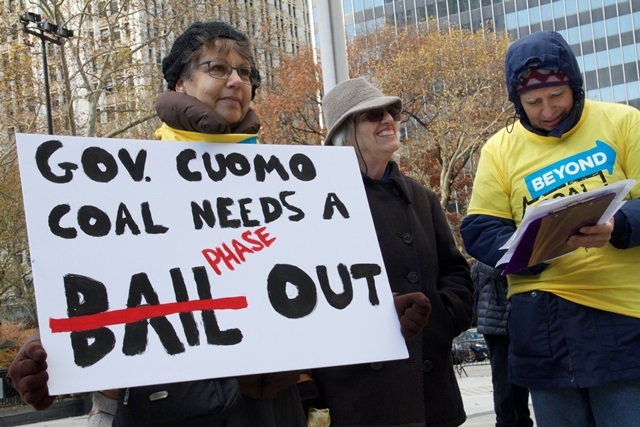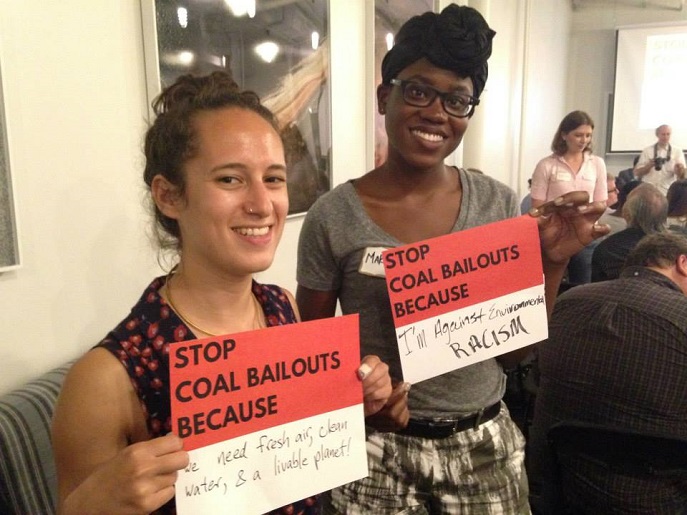Something groundbreaking is afoot in New York. Environmental advocates are making politically vulnerable the dirty energy policies that for years have inched under the public’s radar, eluding criticism under the banner of “business as usual.” Now, key Sierra Club activists and their allies are ensuring New York’s most harmful energy industry answers for its crimes. As Sierra Club Beyond Coal organizer Daniel Sherrell puts it, “We’ve fundamentally changed the politics on coal in the state of New York. Even just a year or two ago, few people were talking about the massive bailouts the Cuomo administration was approving to prop up aging coal plants on the backs of New York electricity customers. In 2015, thanks to our organizing work, coal bailouts became a hot button issue, and the possibility of Governor Cuomo committing to phase out our coal fleet completely, which he did two days ago, came into sight for the first time.”
New York’s governor hit the spot with environmental advocates when he promised in Wednesday's State of the State Address that New York will retire all of its coal plants by 2020, and supplant at least 50 percent of its electric power with renewable energy sources by the year 2030. The news is momentous, and comes alongside equally progressive pledges like Vermont Governor Peter Shumlin’s, who plans to divest his state’s pension funds from coal and ExxonMobil. Both announcements were made on the tail of December’s Paris Climate Summit, which has invigorated the environmental agendas of many elected officials. Sherrell calls Cuomo's move "an amazing political 180."
2015 was no doubt a build-up to this victory. Last year saw landmark action on coal in the Empire State. The Sierra Club’s Team New York activists helped catalyze the retirement of the Huntley coal plant, put on indefinite hold the “re-powering” of the Dunkirk coal plant, and pushed the Cayuga coal plant to the brink of decommissioning. In a show of support, over a third of the state legislature signed a letter to Governor Cuomo, urging him to end coal plant bailouts.

Leading up to Cuomo's announcement, volunteers pushed for the end of coal using rallies and demonstrations.
Throughout the process, activists endorsed measures establishing a safety net for the communities hit immediately by plant closures, showing that the environment and jobs need not be pitted against one another, and progressive action can be taken on both simultaneously. The state allocated $19 million to communities making the transition away from fossil fuel plants, which Sherrell calls “a good first step in providing the funding and planning necessary to support coal-dependent communities” as they make the move to green energy.
Although only in his mid-twenties, Sherrell’s experience with climate action is already remarkable. The son of an oceanographer, Sherrell says his awareness of climate change started with the stories his father would tell after returning from research expeditions in the melting Antarctic. While attending Brown University, Sherrell, along with other students, launched the effort to divest the school’s endowment from coal, one of the first fossil fuel divestment campaigns in history. Sherrell says that participation in the endeavor changed his thoughts on strategic activism, in many ways priming him for the role he’s filling in New York.
Out of college, Sherrell helped organize a grassroots campaign pushing for Rhode Island climate legislation in the form of the Resilient RI Act, one of the most comprehensive state environmental laws in the country – once again a historical undertaking. Sherrell’s first engagement with the Sierra Club was as an organizer for the People’s Climate March, which drew 400,000 activists to the streets of Manhattan on September 21, 2014. From there, Sherrell went on to work as the New York City organizer for the Beyond Coal campaign.
“Our biggest 2016 challenge has already been overcome, with the overarching commitment from Governor Cuomo to phase out coal burning entirely,” Sherrell celebrates. “But we’ll need to use the organizing muscle we've built to work on other priorities, like kick-starting off-shore wind development. There's a lot on our plate, but I'm excited about the opportunity we have to pivot off our victories in phasing out dirty energy and channel that momentum toward phasing in renewables, quickly and at scale.”
For Sherrell and his fellow Beyond Coal organizer David Alicea, this means long days – sometimes in the office, sometimes never setting foot in the office at all. As Sherrell puts it, “No day is ever quite the same.”
Amid the whirlwind of activism are what Sherrell describes as “in-between moments,” which for him carry the most meaningful interactions: “During a Sunday art build, or cleaning up after a teach-in – when conversation turns momentarily away from tactics and emails, and people open up a bit more: what scares them about climate change? What gives them hope? Where do they see the climate movement in five, fifty, one hundred years? I think great organizing teams are built on great relationships, and great relationships are forged from this kind of communication and vulnerability.”

Volunteers Dara Illowsky, left, and Makayla Comas, right, demonstrate their personal reasons for fighting to stop coal bailouts.
The fight against coal encompasses a common humanity, which Sherrell finds to be of immense value. “Activism brings together people who would never otherwise interact: a 93-year-old grandmother, a 30-something computer programmer, a first-generation college freshman. Just watching these people working together and empowering each other in the context of a campaign is one of the most amazing parts of my work.”
And it’s work he plans to continue doing. Sherrell espouses faith in the tenets of grassroots activism and all it is capable of accomplishing. “I see no other source of power large enough to go up against the extremely wealthy interests that benefit from the energy status quo,” he says. “When I look back in 2050, I hope I can say the climate movement helped define a generation. Kind of like Martin Luther King Jr.’s March on Washington: a ton of people went, and even those who didn’t claimed they did.”
